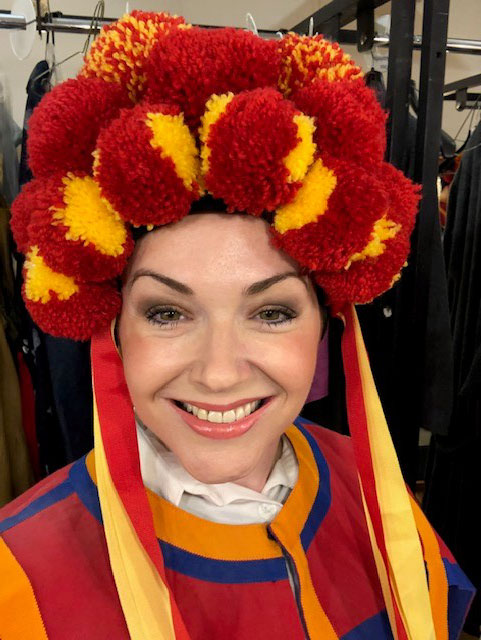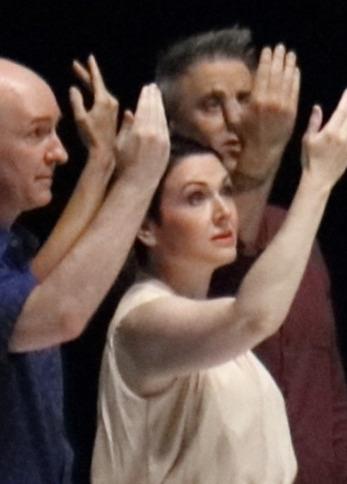2 June 2020
As it was and remains for so many people, unemployment came as a shock to the system for nurse and State Opera singer Danielle Ruggiero-Prior.

“How can somebody with so much education, a really, really good stable career, have to go and get Centrelink? It was a bit baffling,’’ she says.
An enrolled nurse working as a casual at Flinders Medical Centre, Danielle suddenly found herself out of work and out of pocket when the ban on non-urgent elective surgeries came into effect in March.
The Government-imposed ban was implemented to free up beds for an anticipated surge in coronavirus cases, which thankfully hasn’t eventuated, and also due to the shortage of PPE at the time.
But with the progress in containing the spread of COVID-19 and a significant increase in PPE stockpile, South Australia, on May 13, became the first state to begin to fully restore elective surgery.
Suddenly Danielle was back in work after weeks of “difficult, depressing’’ times.
“I basically didn’t have any work from March until a couple of weeks ago,’’ she said.
“I was always trying to remain positive and remain proactive, trying to not take it personally and not become demotivated.
“But every day when you’re putting yourself up for work and you’re being cancelled every day, it was pretty depressing. Because when you tell people you are a nurse, they go ‘Oh my God, you must be getting so much work at the moment with the pandemic’.
“And you explain that you haven’t had shifts for, I think it was six weeks. They don’t really understand, they look a bit baffled. It was incredibly, incredibly difficult.’’
A nurse for 10 years, Danielle made the decision to join the Flinders casual pool last July to allow her to pursue her other passion … as a singer with the State Opera chorus.
“At the beginning of the year I sang at Requiem for the 2020 Adelaide Festival and that was nearly two months of full-time paid, professional singing work,’’ she says. “When Requiem finished in March that’s when all the restrictions came in. So I was really lucky’’.

But her luck ran out when the surgeries ban hit and with the public sector denied access to JobKeeper payments, Danielle, despite a string of tertiary qualifications (including a Diploma of Nursing and Certificates 3 and 4 in Disability), found herself applying for job after job, including call centre work.
“It was pretty depressing. I’ve never had to access anything like this ever before (JobSeeker). I’ve always had a job, always been employed, always been earning an income,’’ she says.
“I think that when this happened, the casual nurses, Flinders and the public sector, we weren’t able to get JobKeeper, that was a real slap in the face. I actually did apply and got some help from Centrelink.
“They changed the rules so we could actually go in and say that we weren’t working. It was a bit scary. It took ages for my claim to be submitted because of a few errors on the system.’’
Australian Nursing and Midwifery Federation (SA Branch) CEO/Secretary Adj. Associate Professor Elizabeth Dabars AM said the ANMF (SA Branch) campaigned on behalf of the casual workforce, writing to Premier Steven Marshall, “urging his Government to guarantee an additional 15 days of paid special COVID-19 leave for all nurses, midwives and personal care workers in all sectors and employment types, including casual staff.
“The ANMF (SA Branch) also ran a petition to show support for 15 days paid special COVID-19 leave, which attracted more than 8,700 signatures,’’ Ms Dabars said.
Ms Dabars said the move to return to full elective surgery was “welcome news”. “The elective surgery shutdown has brought economic pain and stress for hundreds of nurses. We hope the resumption of elective surgeries will see them back in the workforce far sooner than later,’’ she said.
Fortunately in Danielle’s case, her husband Chris had an “essential job”. “He drives buses for Torrens Transit which is considered to be essential. He also runs his own business as well, which is handyman, building and carpentry,’’ Danielle says. But the couple still had to get the mortgage put on hold.
“It’s just an uncertain feeling,’’ she says. “I had somebody say something to me the other day that got me a bit upset. They said ‘Well, you know, you’ve got to remember that when you’re casual that’s your choice. There’s no certainty of shifts, that’s just something you have to deal with’.
“Not a lot of people understand why people are casual.

Some people like a permanent part-time or permanent full-time job, they like that stability. Then there are others like me like, lots of other people, who can’t commit or don’t think they can commit.
“I just couldn’t commit. But I never, ever in a million years would imagine that we would be in the midst of a pandemic and that it would have affected people, especially nurses, like this.’’
Thankfully with the ban easing Danielle is back in casual work again.
It is projected that our public hospitals will be able to ramp back up to normal elective surgery levels by early to mid-next month, as long as it remains safe to do so, while restrictions placed on dentistry will also be lifted.
“Now things have started to pick up but it was a very, very stressful time and I think the fact we’re in the midst of a pandemic, that everything was closed, there was sort of no social interaction, we were isolating, I’m talking me and the other casuals, we weren’t working. It was pretty depressing actually and difficult.’’
“I just felt really desperate because the general feeling from me and everybody else that has been working in a casual capacity was the uncertainty. We didn’t really know how long this would be going to go on for.
“I’m back at Flinders and getting a lot more work now. I’m on a Facebook forum with a lot of other nurses.
“It seems a lot of people are still being cancelled so we are not really sure whether it’s just a time thing. Some people say it’s (shift work) picking up, and others say that it’s not.’’